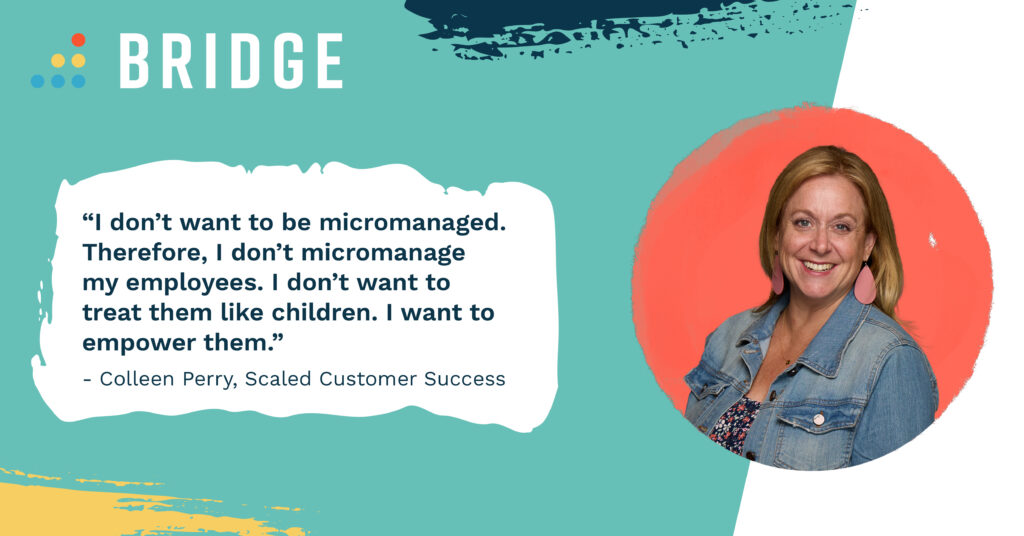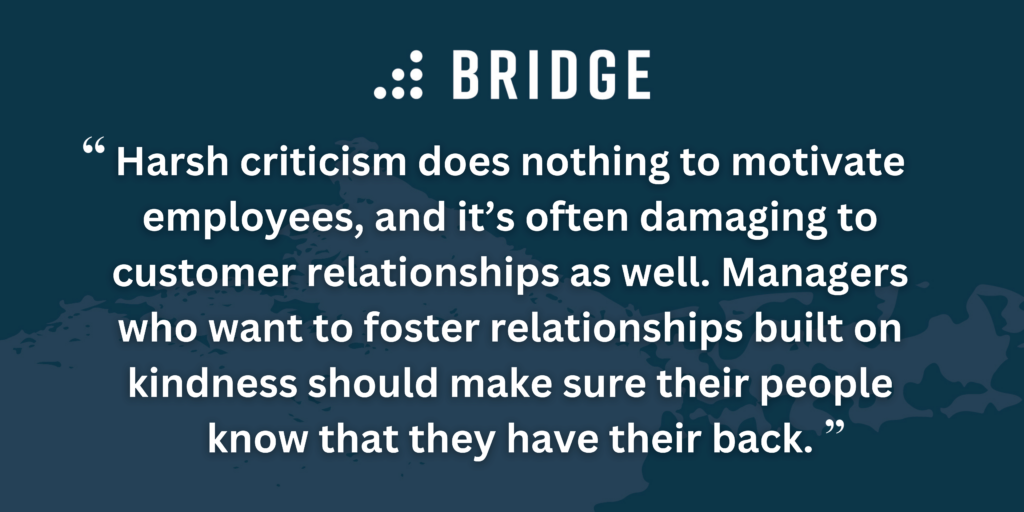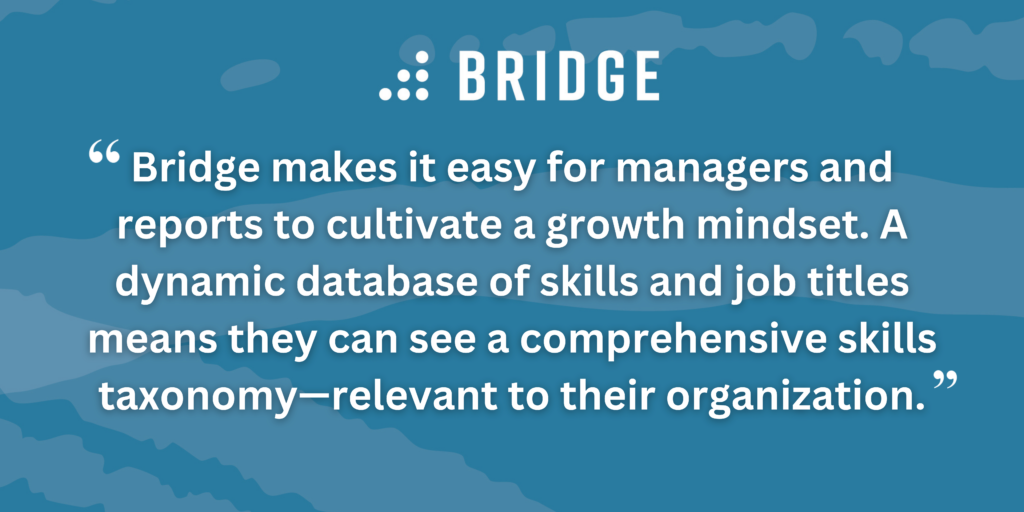Empowered leaders build thriving teams. Managers are often so busy, though, that they struggle to find new and creative ways of motivating their people to perform properly. Helping managers stay educated on effective strategies—and enabling them with the right performance and talent management tools—can make all the difference.
In September, our very own high-achieving manager, Colleen Perry, sat down with Brad Bilen, host of the ManagerMirror podcast, to discuss what she’s learned about building productive teams—even in challenging environments. Colleen has excelled in her role managing Scaled Customer Success since 2022. With a Master’s degree in Adult Education and decades of experience in people leadership, Colleen’s insights from episode 8 of season 6 are invaluable.
Read on to see how letting her values guide her has helped her achieve top results, and how you can support your organization’s managers to do the same.
MORE FROM THE BRIDGE BLOG | ‘Why You Need to Be Investing in Manager Coaching’
Value #1: Collaboration Benefits the Entire Business
Collaboration is a key value for Colleen. “It’s truly core to who I am. Orchestrating a symphony of successful relationships across a business has been one of my biggest accomplishments,” she says.
Many managers want to do the same, but helping diverse teams work together can feel challenging. Colleen would advise leaders to spend more time listening than they do speaking—taking the time to hear someone out can boost collaboration more than anything else.
“It’s all about listening. [The following] steps are simple, but they’re often overlooked: Take the time to meet with people, truly get to know them, make an effort to understand them, and let them talk.”
When managers show sincere interest in their team’s day-to-day experiences, folks are much more likely to be motivated to work together to drive outcomes. Moreover, leaders will have a much easier time finding shared goals than convincing someone to work towards targets that they don't really care about.
The right technology can help your organization's managers foster collaboration. Bridge is an all-in-one skills development platform that helps leaders understand their teams and motivate them to work together. Our Goals feature, for example, makes it easy for managers to assign and track objectives for their reports. In a few clicks, they can align these with team outcomes or even broader business targets—making it easy for their reports to keep collaboration top of mind. They can even break larger goals into more manageable subtasks, or share wins with their report’s team.

READ MORE ON PERFORMANCE MANAGEMENT | ‘How to Create a Culture of Continuous Feedback’
Value #2: Independence Boosts Intrinsic Motivation
“I crave autonomy—once my boss and I agreed on something, I want to be trusted to go and do it,” Colleen says, explaining why independence is so crucial to her happiness at work.
This will resonate with a lot of employees—people hate their every move being watched. “I don’t want to be micromanaged. Therefore, I don’t micromanage my employees. I don’t want to treat them like children. I want to empower them,” she says.
Managers who want to see top results can learn from this mindset. Trusting reports—while empowering them with the right resources and conversations—is usually more effective than a carrots-and-sticks approach.
Colleen observes that being given room to grow has allowed her to be more assertive and more effective in her own role. Earlier in her career, she tended to ask for permission before doing anything. Now, she’s empowered enough to take ownership and move projects forward using her expert judgment. She encourages her reports to do the same—and this has led to more productivity and better business outcomes.
Leaders who want to achieve the same results can benefit from digital tools. Bridge’s Skills Development Plans, for example, help managers and reports get a global view of career goals. Prefilled suggestions help them identify existing skills and decide on what they would like to improve.
Managers can also create learning Journeys to help folks steadily build up the capability and confidence they need to work more independently. In a few clicks, they can assign specific learning modules or tasks to advance each goal and see their report’s progress at a glance—all on one intuitive platform.
HANDPICKED FOR YOU | ‘How HR Can Help Managers With Talent Development’

Value #3: Kindness Helps Employees Grow
“What I like to project out to my teams is: I'm here for you—if you’re having a bad moment, I'm going to support you,” Colleen says, showing how much she values being kind to her team.
Earlier in her career, she had a negative experience with a leader who unduly criticized her in front of a client, which caused poor business outcomes. This led to a big aha moment: Colleen never wanted to motivate her people using fear. Harsh criticism does nothing to motivate employees, and it’s often damaging to customer relationships as well.
Managers who want to foster relationships built on kindness should make sure their people know they have their backs. Colleen achieves this through an open-door policy. Though she has firm boundaries, she explicitly encourages her team to contact her before challenges turn into problems.
Even when an employee makes mistakes, she’s very careful not to make them feel worse in front of customers or teammates. She only has tough conversations behind the scenes, where she can assure her people that she's committed to helping them do better.
Bridge’s feedback options can provide scaffolding to help leaders have kind, constructive conversations. In a few clicks, employees and managers can request skills feedback from relevant teammates or the broader business. Having written comments on what they can do to improve gives people the space they need to take any advice on board.
Employees and managers can also ask for stop-start-continue feedback. These three simple pointers help teammates share where someone might be going wrong, while also complimenting them on what they're doing right. This framework can be especially useful when it comes to navigating tough conversations, without harming someone's confidence.

Value #4: A Growth Mindset Empowers Teams
Colleen cultivates a growth mindset—both in herself and her teams. “I believe in the importance of striving to get better, to learn more, and lean into new experiences,” she says.
In busy environments, it can be hard to motivate reports to work on their growth continuously. Colleen finds that weaving reminders into everyday conversations helps. She’s regularly asking: “Here’s what we’ve been doing well—how can we do it even better? What kind of resources would we need to get there?”
“If someone is feeling insecure, I try to remind them how they’re going to feel on the other side of a difficult task—and I always celebrate their wins,” she says.
Managers can consider challenging their reports with a mixture of short- and long-term goals, making sure to give appropriate feedback or praise along the way. This helps people see that there’s a clear way to become better than they were before.
Bridge makes it easy for managers and reports to cultivate a growth mindset.
A dynamic database of skills and job titles means they can see a comprehensive skills taxonomy that’s relevant to their organization. Bridge makes it easy to measure any competency goals against industry standards, while captivating visual representations of reports’ progress empower them to stay on track.
Our free card game, Bridge Career Drivers, can also come in handy. Insightful conversation starters on a series of cards give both managers and reports a framework for understanding themselves. Players pick from a series of drivers—factors that fulfill them at work—and discuss what their ideal job setup would look like. The game helps managers and reports get away from workplace jargon and speak directly and authentically about what they need to do to grow, every day.
Help Your Managers Build Motivated Teams
With employees three times more likely to stay in a job when they're happy with their managers, value-driven leadership can make a big difference to your company culture and your bottom line. Claim your copy of ‘How to Empower Your Managers to Be Coaches’ below.





